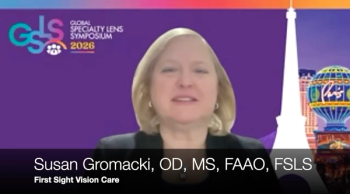
AAOpt 2022: Understanding antibiotics: the how and when to prescribe
Blair Lonsberry, MS, OD, MEd, FAAO, shares highlights from his 2022 American Academy of Optometry presentation, "Simplifying systemic antibiotics."
Blair Lonsberry, MS, OD, MEd, FAAO, professor at Pacific University in Oregon, speaks with Optometry Times®' Kassi Jackson on highlights from his discussion titled, "Simplifying systemic antibiotics," which he presented during the 2022 American Academy of Optometry (AAOpt) annual meeting in San Diego.
Editor's note: This transcript has been edited for clarity.
Jackson:
Hi, everyone. I'm joined today by Dr. Blair Lonsberry, professor at Pacific University in Oregon. He's here to share highlights from his discussion titled, "Simplifying systemic antibiotics," which he is presenting during the 2022. American Academy of optometry meeting this year in San Diego. Thank you for being here. Dr. Lonsberry.
Lonsberry:
Thanks, Kassi. It's good to be here.
Jackson:
Yeah, so would you please just dive right in, share with us some key takeaways from your presentation?
Lonsberry:
Yep. So I think when it comes to prescribing antibiotics, optometrists do topicals really well. We don't tend to hesitate about prescribing topical medications. But when it comes to oral medications, I think that optometrists tend to hesitate. And there are certain conditions where the orals are the only way you can go to treat certain conditions, particularly any skin related conditions... And I think optometrists still tend to hesitate a little bit because they don't necessarily feel comfortable with prescribing them.
So through the lecture, I just wanted to go through various different conditions that we'll see in our offices, and show them what kind of antibiotics could be used and understanding that we might treat similar conditions with multiple different antibiotics, because a patient may be allergic to one or maybe a cost issue. So wanting to make sure that they know that they had a variety of different options for them.
What I also wanted to highlight was, in particular, we tend to use the penicillin group. And there's a lot of patients who say they have penicillin allergies. And the CDC has recently come out and said, basically, if you have a penicillin allergy, you likely don't. 90% of patients who have penicillin allergies don't actually have a penicillin allergy. And even if they did have one as a child, they tend to grow out of it. So [the CDC is] recommending any health care professional, [that if] patient comes in with a penicillin allergy to request that they get penicillin testing done to confirm if they do or do not. The likelihood is they probably don't. And in particular, for eyecare, it takes away a major group of antibiotics that we primarily use, they're our go-to. And if we take away that group of medications, we're not left with a lot of other options to go with.
Then just kind of going through the various groups of antibiotics, mainly talking about the penicillin group; what conditions we would indicate that for; what to watch out for, for a patient being allergic or having a reaction to those medications; and then some newer information just on antibiotics that we use that can potentially cross react with other medications. In particular, something like Bactrim—or septra—which is used for MRSA infections. But patients on methotrexate, it could be deadly for that patient because it actually shuts down bone marrow production of blood cells and so on. And that's something that [has] just kind of been around for a while, but is now hitting the press much more.
So making doctors feel comfortable, but also taking precautions to make sure that they're looking for drug interactions for medications that patients might be taking, as well.
Jackson:
And you know, you kind of touched on it, alluded to it, but why is this so important for optometrists to discuss?
Lonsberry:
Well, most of the states now have the ability [for optometrists] to prescribe oral medications, that's been something that has taken a lot of time to get laws passed in each of the states [for optometrists] to be able to prescribe oral medications. And again, I don't think a lot of doctors feel comfortable with it.
And when I did this lecture originally, probably 7 or 8 years ago, I thought no one would show up to the lecture. And the first time I did it, like 500 people showed up. And I was surprised. And I think because people don't necessarily feel comfortable with oral medications, and [in] oral medications, the there's lots of resistance that's coming up. And there's not...necessarily a lot of new groups and medications that are coming out.
So knowing when to prescribe them, how to prescribe them, [and] what to do if it doesn't work, is really important that we not only treat conditions, but we also don't help to encourage resistance development in the certain medications that we do have.
One of the things I talk about is for adult prescriptions, we really don't want to prescribe more than 7 days. If you don't take care of that infection in 7 days, you need to switch that to another antibiotic, like don't extend that prescription do another 7 days. So if I'm doing Augmentin, I'll switch to Keflex to try to get rid of that infection. And things like that is going to help not only treat our patients but also help to stem this resistance issue that's developing with antibiotics.
Jackson:
What does this mean for patient care?
Lonsberry:
Yeah, so it means that we, I think, again, patients come to us for their eye care, which means assessing the tissues around the eye.
We're not tending to be doing a lot of oral antibiotics for conjunctivitis, and things that we would normally use topicals for, but I do think patients still come to us for anything that's associated with the eye. So infections around the lids, instead of having to refer them to a primary care physician who doesn't necessarily know a lot about the eyes, that we are the experts in this area.
And a lot of times these are emergent patients, as well. They're getting an infection, and it's an emergent, and it's hard for them to get into a primary care physician. It's much easier probably to get in with us. And we are the ones who should be taking care of this.
I get texts all the time from friends who've got eye infections and are going, "What should I do? I went to urgent care and it's not being taken care of." And I'm going, "That's because you should call me first." Because we know what's going on with the eye. So I think...it's the most efficient way for patients to be taken care of. And it's the most effective way for them to be taken care of as well.
Jackson:
Is there anything you'd like to be sure to add that we didn't touch on?
Lonsberry:
I just think that I want doctors to be confident. They know what's going on with the eyes, and to be confident when they write prescriptions. No one's saying you have to memorize everything, but you can look stuff up. But just to make sure that they do feel confident when they do prescribe . They're doing work in the best interests of their patients.
Jackson:
Great. Well, Dr. Lonsberry, thank you so much for your time today.
Newsletter
Want more insights like this? Subscribe to Optometry Times and get clinical pearls and practice tips delivered straight to your inbox.



























